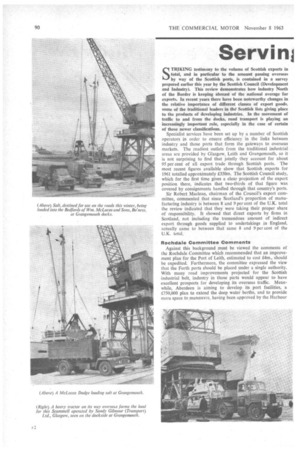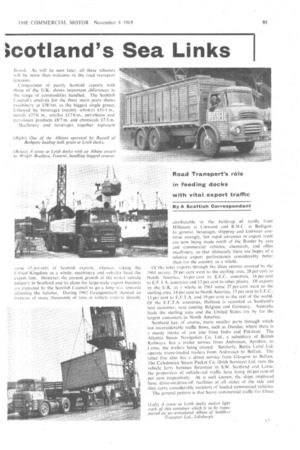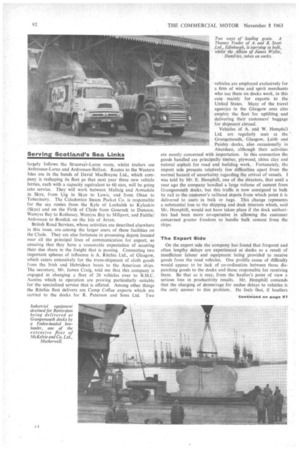Servini ;cotland's Sea Links
Page 94

Page 95

Page 96

Page 101

If you've noticed an error in this article please click here to report it so we can fix it.
STR,1KING testimony to the volume of Scottish exports in total, and in particular to the amount passing overseas by way of the Scottish ports, is contained in a survey prepared earlier this year by the Scottish Council (Development and Industry). This review demonstrates how industry North of the Border is keeping abreast of the national average for exports. In recent years there have been noteworthy changes in the relative importance of different classes of export goods, some of the traditional leaders in the Scottish lists giving place to the products of developing industries. In the movement of traffic to and from the docks, road transport is playing an increasingly important role, especially in the case of certain of these newer classifications.
Specialist services have been set up by a number of Scottish operators in order to ensure efficiency in the links between industry and those ports that form the gateways to overseas markets. The readiest outlets from the traditional industrial areas are provided by Glasgow, Leith and Grangemouth, so it is not surprising to find that jointly they account for about 95 per cent of all export trade through Scottish ports. The most recent figures available show that Scottish exports for 1961 totalled approximately £350m. The Scottish Council study, which for the first time gives a clear projection of the export position there, indicates that two-thirds of that figure was covered by consignments handled through that country's ports.
Sir Robert Maclean, chairman of the Council's export committee, commented that since Scotland's proportion of manufacturing industry is between 8 and 9 per cent of the U.K. total the review indicated that they were taking their proper share of responsibility. It showed that direct exports by firms in Scotland, not including the tremendous amount of indirect export through goods supplied to undertakings in England, actually came to between that same 8 and 9 per cent of the U.K. total.
Rochdale Committee Comments Against this background must be viewed the comments of the Rochdale Committee which recommended that an improvement plan for the Port of Leith, estimated to cost £4m., should be expedited. Furthermore, the committee expressed the view that the Forth ports should be placed under a single authority. With many road improvements projected for the Scottish industrial belt, industry in those parts would appear to have excellent prospects for developing its overseas traffic. Meanwhile, Aberdeen is aiming to develop its port facilities, a £750,000 plan to extend the deep water berths, and to provide more space to manceuvre, having been approved by the Harbour Board. As will be seen later, all these schemes will be more than welcomc to the road transport interests.
Comparison of purely Scottish exports with those of the U.K. shows important differences in the range of commodities handled. The Scottish Council's analysis for the three main ports shows machinery at 158-1m, as the biggest single group, followed by beverages (mainly whisky) £511 m., metals i:27.6 m., textiles £17.6 m., petroleum and petroleum products f8-7 in. and chemicals £73 m.
Machinery and beverages together represent sonic 45 per cent of Scottish exports, whereas. taking the United Kingdom as a whole, machinery and vehicles head the export lists. However, the present growth of the motor vehicle industry in Scotland and its plans for large-scale export business are expected by the Scottish Council to go a long way towards adjusting the balance. During 1962 Grangemouth showed an increase of many thousands of tons in vehicle exports directly attributable to the build-up of tariffs from Hillmans at Linwood and B.M.C. at Bathgate. In general, beverages, shipping and knitwear continue strongly, but rapid advances in export trade arc now being made north of the Border by cars and commercial vehicles, chemicals, and office machinery, so that ultimately there are hopes of a relative export performance considerably better than for the country as a whole.
Of the total exports through the three centres covered by the 1961 survey, 29 per cent went to the sterling area, 28 per cent to North America, 16 per cent to E.E.C. countries, 14 per cent to E.F.T.A. countries and 13 per cent to other places. Of exports by the U.K. as a whole in 1961 some 37 per cent went to the sterling area. 14 per cent to North America, 17 per cent to E.E.C., 13 per cent to E.F.T.A. and 19 per cent to the rest of the world. Of the F.F.T.A. countries, Holland is recorded as Scotland's best customer, next coming Belgium and Germany. Australia leads the sterling area and the United States are by far the largest customers in North America.
Scotland has, of course, many smaller ports through which not inconsiderable traffic flows, such as Dundee, where there is a steady intake of raw jute from India and Pakistan. The Atlantic Steam Navigation Co. Ltd., a subsidiary of British Railways, has a trailer service from ArdroSsan, Ayrshire, to , Lame, the trailers being craned. Similarly, Burns Laird Ltd. operate crane-loaded trailers from Ardrossan to Belfast. The latter line also has a direct .service from Glasgow to Belfast. The Caledonian Steam Packet Co. (Irish Services) Ltd. runs the vehicle ferry between Stranraer in S.W. Scotland and Larne, the proportion of vehicle-rail traffic here being 60 per cent-40 per cent respectively. As is well known, the ships employed have drive-on/drive-off facilities at all states of the tide and they carry considerable numbers of loaded commercial vehicles.
The general pattern is that heavy commercial traffic for Ulster largely follows the Strartraer-Larne route, whilst trailers use Ardrossan-Larne and Ardrossan-Belfast. Routes to the Western Isles are in the hands of David MacBrayne Ltd., which company is reshaping its fleet po that next year three new vehicle ferries, each with a capacity equivalent to 60 cars, will be going into service. They will work between Mallaig and Armadale in Skye, from Uig in Skye to Lewis, and from Oban to Tobermory. The Caledonian Steam Packet Co. is responsible for the sea routes from the Kyle of Lochalsh to Kyleakin (Skye) and on the Firth of Clyde from Gourock to Dunoon, Wernyss Bay to Rothesay, Wemyss Bay to Mifiport, and Fairlie/ Ardrossan to Brodick on the Isle of Arran.
British Road Services, whose activities are described elsewhere in this issue, are-among the larger users of these facilities on the Clyde. They are also fortunate in possessing depots located near all the principal lines of communication for export, so ensuring that they have a reasonable expectation of securing their due share in the freight that is passing. Connecting two important spheres of influence is A. Ritchie Ltd., of Glasgow, which caters extensively for the trans-shipment of cloth goods from the Irish and Hebridean boats to the American ships. The secretary, Mr. James Craig, told me that this company is engaged in changing a fleet of 26 vehicles over to B.M.C. Austins which in operation are proving particularly suitable for the specialized service that is offered. Among other things the Ritchie fleet delivers are Camp Coffee exports which are carried to the docks for R. Paterson and Sons Ltd. Two vehicles are employed exclusively for a firm of wine and spirit merchants who use them on docks work, in this case mainly for exports to the United States. Many of the travel agencies in the Glasgow area also employ the fleet for uplifting and delivering their customers baggage for shipment abroad.
Vehicles of A. and W. Hemphill Ltd. are regularly seen at the Grangemouth, Glasgow, Leith and Paisley docks, also occasionally in Aberdeen, although their activities are mostly concerned with importation. In this connection the goods handled are principally, timber, plywood, china clay and natural asphalt for road and building work. Fortunately, the import side presents relatively few difficulties apart from the normal hazard of uncertainty regarding the arrival of vessels. I was told by Mr. E. Hemphill, one of the directors, that until a year ago the company handled a large volume of cement from Grangemouth docks, but this traffic is now consigned in bulk by rail to the customer's railhead depots from which point it is delivered to users in bulk or bags. This change represents a substantial loss to the shipping and dock interests which, said Mr. Hemphill, would not have taken place if the dock authorities had been more co-operative in allowing the customer concerned greater freedom to handle hulk cement from the ships.
The Export Side On the export side the company has found that frequent and often lengthy delays are experienced at docks, as a result of insufficient labour and equipment being provided to receive goods from the road vehicles. One prolific cause of difficulty would appear to be lack of co-ordination between those dispatching goods to the docks and those responsible for receiving them. Be that as it may, from the haulier's point of view a serious loss in productivity results. Mr. Hemphill contends that the charging of demurrage for undue delays to vehicles is the only answer to this problem.. He feels that, if hauliers would implement this policy, turnround times would show an immediate improvement. In his opinion, if road operators were responsible for handling goods to and from the vehicle and quay this work would be carried out faster and at less cost.
A considerable part of the business of John Russell (Grangemouth) Ltd. lies in transporting Scottish beef and lambs to the Continent in refrigerated vehicles, but units of thc Russell fleet :ffe Seen in all the main Scottish ports, the greatest percentage of traffic being through Grangemouth, Leith and Glasgow. Mr. R. Foulkes, the company's manager, told me that Grangemouth and Leith dock activities are expanding rapidly, larger ships arc being berthed and they are taking traffic that would formerly have gone through English ptirts. Problems that face road transport operators, he said, are that ship loadings are too dependent on the weather, dock transit warehouses being too small, whilst there is not sufficient mechanical loading equipment to deal with the volume of traffic handled. In consequence the vehicle turnround is slowed.
In a different category come J_ and T. Moodie of Glenluce, Wigtownshire, who handle such things ex-clock as granite, animal feeding stuffs and fertilizers. Occasional loads are moved from Lincolnshire and Essex to Ardrossan and Glasgow docks en route for Ireland; combine harvesters arc carried from Kilmarnock to Leith and English ports for export. Mr. Thomas Moodie concurs with the opinion widely held in the industry that over the next few years there will be a steady increase in the use of lift-off containers and semi-trailers for export traffic from Britain to Ireland and the Continent, these units being shipped complete with loads and met at the dock by operators having reciprocal arrangements with their opposite numbers.
Moving Bulk Liquids With a business confined to the transport of liquids in bulk, James Hemphill Ltd., of Glasgow, carries oils and chemicals from the Scottish producers' works to ships which deliver them to Europe, Australia and America. Because of their proximity to the production centres Glasgow and Grangemouth are the ports mainly used. Although the company's work is mainly for the chemical industry a certain amount of fish oil is delivered for food manufacturers. All these products are handled in a semi-refined state for final manufacture abroad. Mr. Wm. McMillan, director, told me that their only real difficulty in carrying out deliveries to ships arises from the fact that certain docks are prone to congestion as some of the sheds and quays were never constructed for road vehicles of modern dimensions. The principal change he expects to see in the pattern of such deliveries is an increase resulting from the extension of bulk handling which makes possible considerable economies and enables ships to employ profitably space that would otherwise be used for ballast.
There are many special facets of shipping work and as one example I would quote the service of Bell and Co. (Transport) Ltd., of Edinburgh, an organization which handles a considerable quantity of household furniture and effects to and from overseas. particularly North America. Two trained teams of men are principally occupied in the daily work of packing and the office gives expert attention to the necessary documentary work for these shipments Within Scotland, the principal port used is Glasgow..
Of the many operators I have encountered on my travels who provide essential services in connection with Scotland's shipping I would in conclusion quote the name of D. McKinnon (Transport) Ltd., of Kilmarnock. Like so many other prominent hauliers Mr. Eric Brown, one of the directors, complains of the long delays liable to confront operators at the docks and points out that the time thus wasted can easily prevent shipping traffic being a properly economical venture.














































































































































































































































